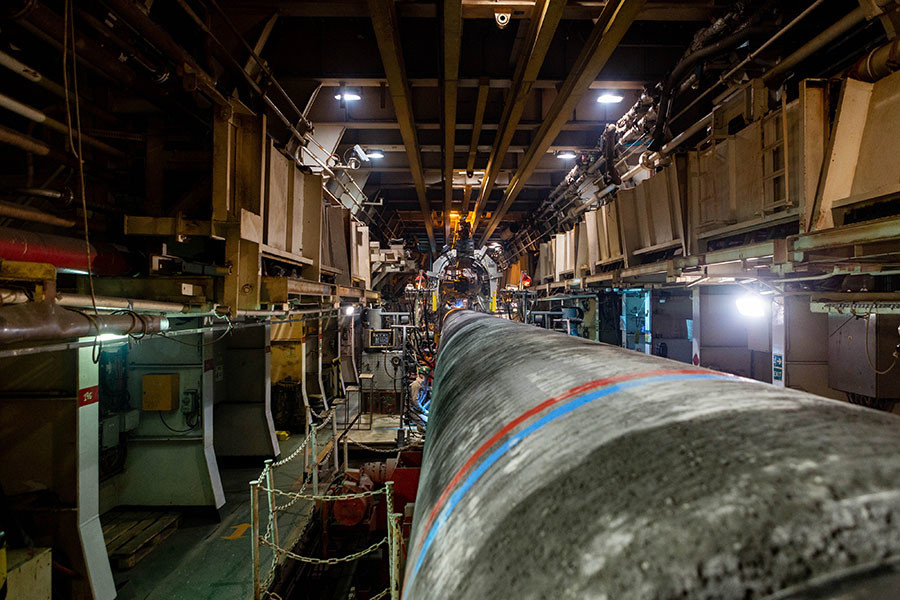The Nord Stream 2 gas pipeline has already been built at more than 80%, and its total length at the moment is about two thousand kilometers, Gazprom said.
“The construction of the Nord Stream 2 gas pipeline is ongoing. To date, 1989 kilometers of the gas pipeline have been laid along the bottom of the Baltic Sea - about 81% of its total length, ”the state-owned company reports to RIA Novosti.
Recall that the Nord Stream 2 project involves the construction of two pipelines of a gas pipeline with a total capacity of 55 billion cubic meters. m. of gas per year and a length of 1,200 km (2,400 km on both lines). It will connect the Russian coast of the Baltic Sea and the north of Germany. The cost of building the pipeline is estimated at € 9.5 billion, and its launch is expected in 2019. In addition to Gazprom, five European companies are participating in the project - Shell, OMV, Uniper, Ungie and Wintershall.
The construction of the pipeline met resistance attempts from a number of European countries, as well as the United States. Representatives of these states have repeatedly stated that Nord Stream 2 will allegedly be used by Moscow to exert pressure on Europe. In particular, the President of Slovakia Andrei Kiska spoke about this in the fall of 2018.
“Slovakia always emphasizes that this is not an economic, but a political project. It is very important to understand if someone constantly repeats that this is only a business project. No way. This is only a political project, ”the politician said then.
Similar statements are often made in the United States. For example, in early September, US Permanent Representative to the EU Gordon Sondland indicated that Nord Stream 2 would supposedly give Russia "too much control."
At the same time, Russia itself emphasizes that Nord Stream 2 is a purely economic, non-political project. According to the Russian side, criticism of the pipeline project from the United States is due to their desire to sell more expensive liquefied natural gas (LNG) to Europe.
- Pipe welding line
- © Nord Stream 2 / Thomas Eugster
“We consider absolutely non-market and anti-democratic attempts to force European consumers to buy more expensive liquefied natural gas from the United States. We hope that when making decisions on the “gas” and other issues, our German and other European partners will be guided by the interests of their peoples, and not by the principles formulated across the ocean, ”Russian Foreign Minister Sergey Lavrov commented on the situation in the summer of 2019.
Lavrov also emphasized that Nord Stream-2 would make it possible to deliver gas to Europe from Russia's northern fields as soon as possible. In addition, European companies and personnel are involved in the construction of the pipeline, the project provides 57 thousand citizens of EU countries with employment.
In this, Russia is also supported by representatives of Germany. On July 18, German Foreign Minister Heiko Maas announced the benefits of the pipeline to European countries.
“This is an economic project, an energy industrial project, which, from our point of view, is very suitable not only for Germany, but also for Europe as a whole,” the politician said.
Denmark Position
Meanwhile, the issue of the pipeline route has still not been finally resolved. Unlike other countries through whose territory Nord Stream 2 runs, Denmark has not yet given permission for its construction. Experts attribute this position of the kingdom to US influence.
In particular, this opinion is shared by the expert of the International Institute for Humanitarian and Political Studies Vladimir Bruter.
“Denmark will not give permission to build on its territory along a route that is advantageous for Russia. But it will give some kind of workaround or not very convenient. Given that more than 80% has already been built, the Danish decision will delay the commissioning of Nord Stream 2 for a month or a half at most. At the same time, Europe needs Russian gas and, if it is too hostile to Russian investment projects, it is quite possible that it will worsen the situation for itself in the first place, ”the expert said in an interview with RT.
At the same time, the director of the Institute for Contemporary State Development Dmitry Solonnikov believes that Germany, which is interested in implementing the Russian project, may put pressure on Denmark.
“The question is rather in the relations between Denmark and Germany: whether Germany, as an interested party, will be able to put pressure on Denmark. If these relations develop, then permission for Nord Stream-2 will be one of the joint actions within the framework of a comprehensive plan. It’s just that the position of Denmark will not change, ”said the expert in an interview with RT.

